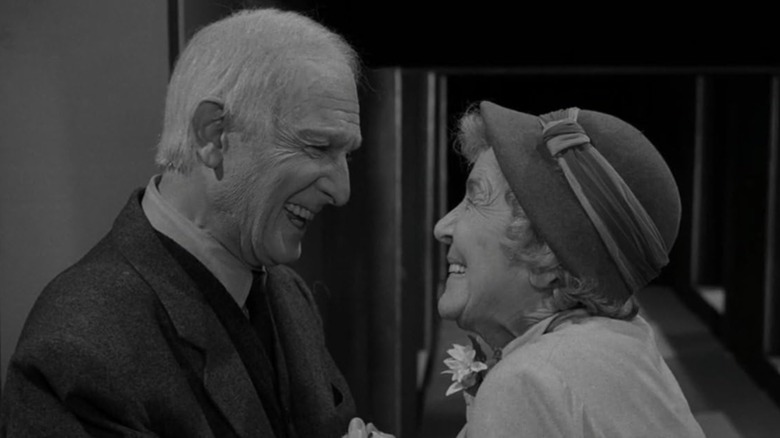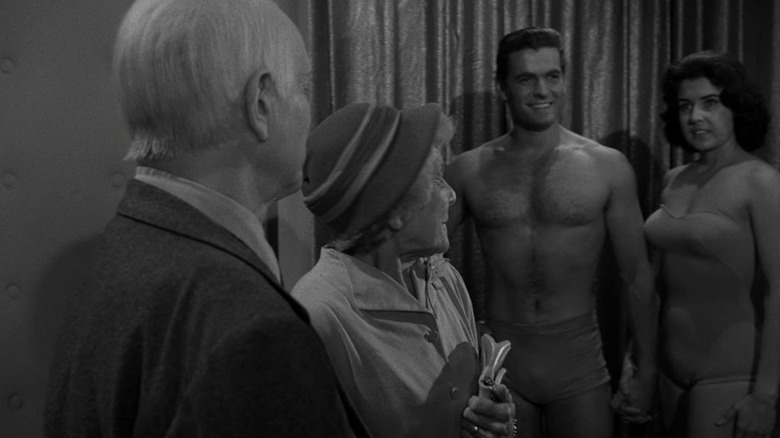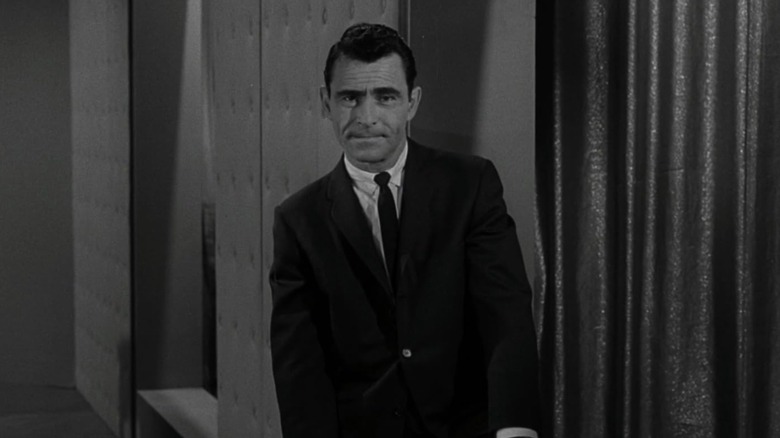The Twilight Zone Unknowingly Cast An Actor Who Was Really Living The Episode's Story
Look close enough at "The Twilight Zone" and it's clear that events surrounding the making of the show were often as unusual as its otherworldly subject matter. It's not that Rod Serling's science fiction classic was cursed: rather, production of the deeply humane series was often interrupted by deeply human moments. There was that time an episode was improved upon by an actor's injury that forced him to speak out of one side of his mouth, and the fact that veteran Serling named the series without realizing that its title was already an air force term used to describe an especially disorienting moment before landing.
Not every coincidence and unusual set story was serendipitous. In season 1, an actor passed away mid-shoot, and Serling paid out of pocket to reshoot his scenes so he wouldn't appear ill in his final performance. A horrific, preventable accident on the set of "Twilight Zone: The Movie" (which was made after Serling passed) is still consider one of Hollywood's most infamous injustices today. On top of all that, it turns out a particularly beautiful and bittersweet episode of the original series was more reflective of reality than its writers had anticipated.
A bittersweet story with a heartbreaking real-life context
The chapter in question is called "The Trade-Ins," and it explores the idea of mortality through the perspective of an elderly couple who are still deeply in love. Thanks to a new innovative technology, the couple, John and Marie Holt (Joseph Schildkraut and Alma Platt), are given the opportunity to trade in their failing bodies for younger, newer models. The couple can only afford to have one of them undergo the procedure, and John is made young again. Though he plans to raise money so Marie can follow suit, his youthfulness brings her to tears, so he decides to "return" the younger body. In the end, the pair decide to face old age and death naturally, hand in hand with the one they love most.
Though "The Trade-Ins" certainly has some logic holes, it's an especially emotional episode of the series, and according to Marc Scott Zicree's book "The Twilight Zone Companion," there was an unexpectedly heartbreaking reason it hit so hard. As episode director Elliot Silverstein later recalled, Schildkraut's own wife was in the last days of her life during shooting. "He was undergoing a tragedy at the time," Silverstein shared. "His own wife was dying." The cast and crew apparently weren't aware of the extent of her illness at the time, but the filmmaker says Schildkraut's second wife, Marie McKay, passed away in the middle of the three-day shoot. McKay died in February 1962, and the episode would air in April of the same year.
'Love possesses not nor would it be possessed'
As tragic as the circumstances surrounding the shoot were, Silverstein says the lead actor wouldn't take time out to grieve. "He insisted that we not stop production for him," he said in Zicree's book. As he recalled it, "The Schildkraut family was a great theatrical family in Europe — he would finish the film and then mourn. He was in real tears, off-screen." The episode's star did in fact come from an acting family, as the son of stage and early screen actor Rudolph Schildkraut. The experience was surely extremely painful for the younger Schildkraut, but he upheld his family's legacy: when he passed just two years later, he was laid to rest alongside Marie and his parents in Hollywood Forever Cemetery.
This story would be easier to hear if it had some lesson, like an episode of "The Twilight Zone." Instead, it's just a sad case of life imitating art, and as usual, Serling's own words on the matter say it best. In this case, the soulful storyteller actually ended the episode by borrowing a phrase from poet Kahlil Gibran. "Love gives not but itself and takes not from itself," the narrator said. "Love possesses not nor would it be possessed, for love is sufficient unto love." The sweet quotation isn't a lesson, Serling promises, but "just a reminder, from all the sentimentalists in the Twilight Zone."


